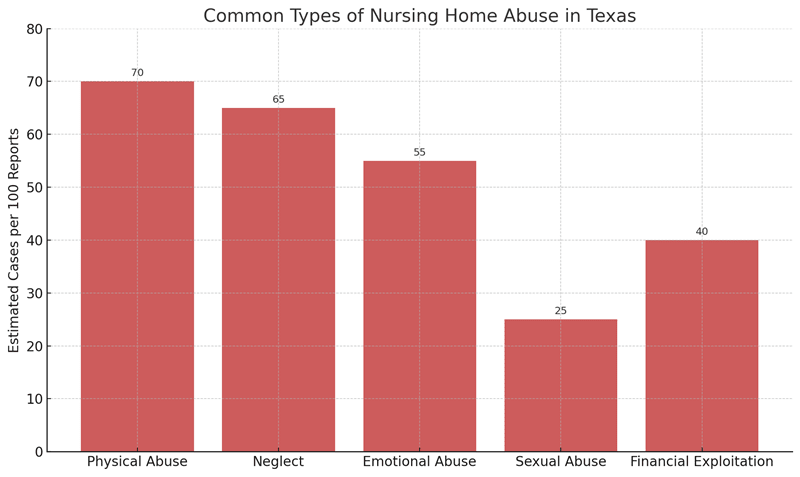Nursing home abuse in Texas is often subtle but devastating, including physical harm, emotional trauma, neglect, or financial exploitation. Families rely on trusts, but neglect and mistreatment still happen. This comprehensive guide from Eric Ramos Law, PLLC (San Antonio-based elder abuse attorneys) will empower you to identify abuse, collect evidence, and take swift legal action.
Understanding Nursing Home Abuse in Texas
Nursing home abuse falls under the umbrella of elder abuse, encompassing six key forms in institutional settings: physical, emotional, sexual, verbal, neglect, and financial exploitation. Texas statutes define abuse as any act or omission resulting in harm or risk to an elderly or disabled resident. Understanding this scope is the first critical step.
Common Signs of Abuse or Neglect
Vigilant families identify early-warning signals. Watch for:
- Physical: Bruises, cuts, bedsores, unexplained fractures
- Neglect: Poor hygiene, dehydration, weight loss, unsanitary conditions
- Emotional & Verbal: Withdrawal, sudden mood changes, fear around staff
- Financial: Missing funds or unexplained charges.
Early detection is key; don’t wait until the effects become permanent.
What to Do Immediately
- Raise the alarm
- Share observations with administrators
- File a complaint with Texas Health and Human Services
- Document meticulously
- Photograph injuries/conditions, keep a detailed journal
- Secure medical records and facility logs
- Escalate legally
- Engage an experienced Texas elder abuse lawyer
- Skip costly delays, swift legal intervention is critical
Common Types of Evidence Used in Texas Nursing Home Cases
To prove an abuse claim under Texas law, you and your attorney must gather evidence demonstrating:
- A duty of care existed,
- A breach of that duty occurred,
- The resident suffered harm, and
- That harm caused measurable damages.
Evidence sources include:
- Medical & facility records showing inconsistencies or unusual incidents
- Inspection reports/citations by state agencies
- Photographs of injuries or poor conditions
- Witness testimony from staff, other residents, or visitors
- Expert analysis (e.g. geriatric or nursing specialists)
The competition mentions Texas Ombudsman reports; here, we emphasize state agency inspection reports and licensed expert witnesses for more robust credibility.
How Eric Ramos Law Strengthens Your Case
At Eric Ramos Law, our comprehensive strategy includes:
- Full investigative review: Access to facility logs, agency records, and Ombudsman filings
- Strategic expert support: Partnering with qualified geriatric medical examiners
- Witness interviews: From first responders to nurses to corroborate your claims
- Forceful legal advocacy: Filing complaints, pursuing full compensation for your loved one
Proving Emotional & Psychological Harm
Abuse isn’t always physical. Emotional and psychological injuries (such as depression, anxiety, fearfulness) require:
- Behavior logs showing shifts in mood and demeanor
- Mental health evaluations, therapy assessments
- Expert testimony illustrating disruption and emotional trauma
This section goes deeper than many competitors by detailing methods to substantiate non-physical injuries.
What to Do If You Suspect Nursing Home Abuse
Time is critical when abuse is suspected. Follow these immediate steps:
- Document Everything
Take detailed notes about your loved one’s physical condition, behavior, and care. Photograph any injuries or unhygienic living conditions. Collect names of staff or witnesses involved. - Request Medical and Facility Records
Texas law allows family members to request medical records and care logs. These can be crucial in identifying inconsistencies or violations of protocol. - Report the Suspected Abuse
You can file a complaint with the Texas Department of Health and Human Services. Their hotline (1-800-458-9858) accepts anonymous tips and will trigger an investigation. - Contact a Nursing Home Abuse Lawyer
An experienced attorney like Eric Ramos can help preserve evidence, access additional records, and guide you through civil and criminal legal processes.
Common Types of Nursing Home Abuse in Texas
FAQs
Q: How long do we have to file a claim in Texas?
A: Generally, the statute of limitations is 2 years from discovering the injury, and prompt action is critical.
Q: Will my loved one be removed from the facility?
A: Not automatically, it depends on the findings. Our lawyers can assist with emergency protective intervention.
Q: What compensation is possible?
A: Recoverable damages include medical bills, pain and suffering, emotional distress, and punitive damages in cases of neglect or recklessness.
9. Legal Remedies in Texas
In nursing home abuse cases, Texas allows you to file a civil lawsuit seeking compensation for:
- Medical expenses
- Pain & suffering
- Mental anguish & emotional distress
- Punitive damages in instances of gross negligence or willful harm
- Legal costs and attorney fees
Why Choose Eric Ramos Law for Your Nursing Home Abuse Case
Our firm has a reputation for helping families across Texas obtain justice in complex injury and abuse cases. We offer:
- Compassionate, client-centered representation
- Thorough case investigations and aggressive litigation
- Proven experience handling elder abuse, wrongful death, and medical malpractice claims
- Free consultations and contingency-fee representation, no recovery, no fee
With our San Antonio office, we’re local, responsive, and ready to take action when your loved one’s safety is on the line.
Conclusion: Take Action Before It’s Too Late
If you suspect that your loved one is experiencing nursing home abuse or neglect, you must act fast. Abuse often escalates or becomes fatal when ignored. Document everything. Report your concerns. And seek legal guidance from a trusted, local attorney.
At Eric Ramos Law, PLLC, we’re here to protect Texas seniors and their families—because everyone deserves to age with dignity.
Call (210) 404‑4878 or visit our Practice Areas page for a free consultation.
